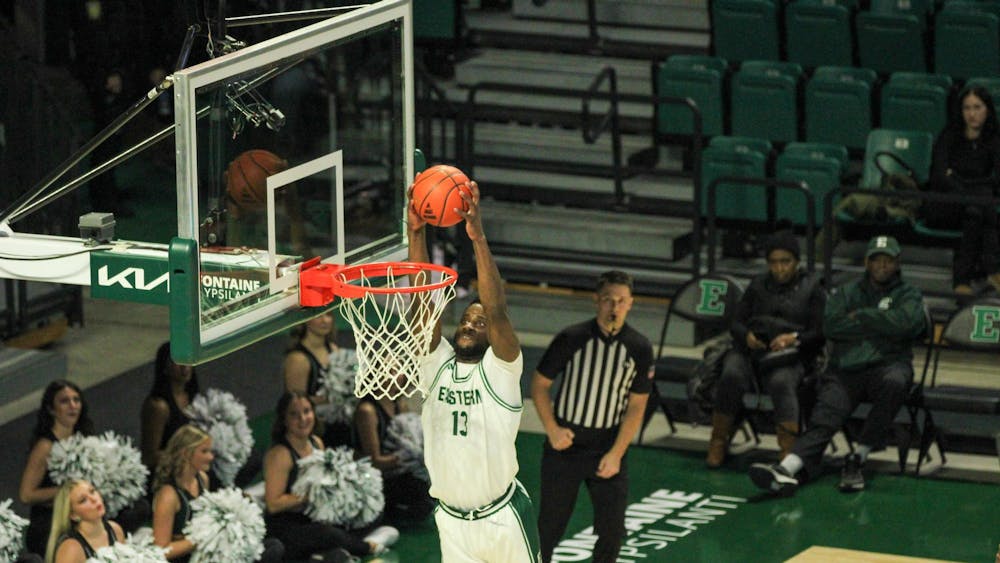Professor Mark C. Carnes, a professor of history at Barnard College in New York, made his second stop to Eastern Michigan University this past Thursday to deliver a lecture entitled “Critical Thinking: Can Neurobiology Help Us?”
During the second part of his lecture series “Rethink Higher Education,” Carnes spoke on the disengagement of students from learning and pondered the links between neurosciences and teaching methods.
In the ‘90s, Carnes pioneered his Reacting to the Past method of teaching, where students take on historical roles and act out history, rather than the usual lecturing. Carnes lauded the efforts of some of Eastern’s teachers who “have taken the plunge” to introduce the method to the university.
“Students’ mental energies are elsewhere,” Carnes said. “Students are engulfed in other activities such as fraternities, parties and other outside distractions. All of these activities containing elements of competition and fantasy, the activities are often a distraction to learning,” he said.
Moving on, Carnes mentioned professors do not agree on much.
“Anyone who has ever been to a faculty meeting can attest to that,” he said.
However, they agree on the necessity of critical thinking, Carnes said. But what is critical thinking, Carnes asked the audience.
Carnes cited a study that showed many students’ political, philosophical and religious beliefs did not change during their time before college and after. Somewhere there was a failure in teaching methods, Carnes said.
Carnes said students often hold “illusory conceptions” and those misconceptions “make us think we know something that we truly don’t know.”
Students’ preconceived notions “prevent us from perceiving the obvious errors in our own logic,” the professor added.
Citing intellectual battles such as Galileo vs. Aristotle, Carnes went through and questioned past methods of teaching. Everything from John Locke’s method of “crushing out ignorance” to the Socratic Method of teaching, Carnes discussed how he believes they are ineffective.
Some predecessors in the field of education suggested the learned must “bury falsities with mounds and mounds of truth.”
However, Carnes likened this method to how parents often deal with troublemaking children, even though they ignored the same rules of right and wrong their parents exposed to them 30 years earlier.
Others suggested the human mind be treated as a blank slate. Isolation was a method of teaching. It was an effort to prevent the mind from getting “infected” with ignorance, but often lead to the mind absorbing nothing, Carnes said.
Carnes also discussed the often-lauded Socratic Method of teaching.
Socrates sought to root out a “morass of ignorance” among the people of ancient Athens by questioning them on what they “knew.” He would simply ask questions of his interviewee until they became befuddled and realized they didn’t know much at all. Then Socrates was supposedly given an open mind to mold.
Carnes noted that although Socrates produced many scholars like Plato, Xenophon and Aristotle, his method could be seen as harmful to his students. His way could be perceived as a “sneaky assault” on the beliefs. Many accounts say this method of constant questioning led people to storm out of the presence of Socrates and become recalcitrant.
Carnes took a break to show a video made by student Vinnie Massimino, which showed the reactions and thoughts of students who had participated in a Reacting to the Past class.
After the video professor Carnes recounted the story of a student who once became so sick she hallucinated that she was the Emperor Wanli of the Ming Dynasty, the role she had been given in her Reacting to the Past class.
Carnes said this was a testament to his method’s ability to engage students, so much so they create another “self” in the process of learning.
Though Carnes concluded at the end of his lecture that there was no definitive link neurobiology could produce between the most effective teaching methods and brain activity, there was an importance in the human mind’s sense of self.
“A sense of self is such a magnet to our thought,” Carnes said.









